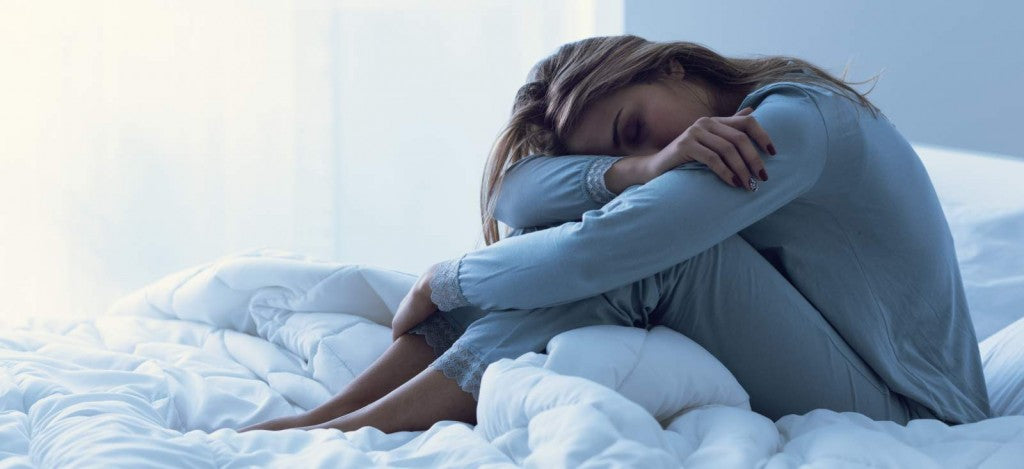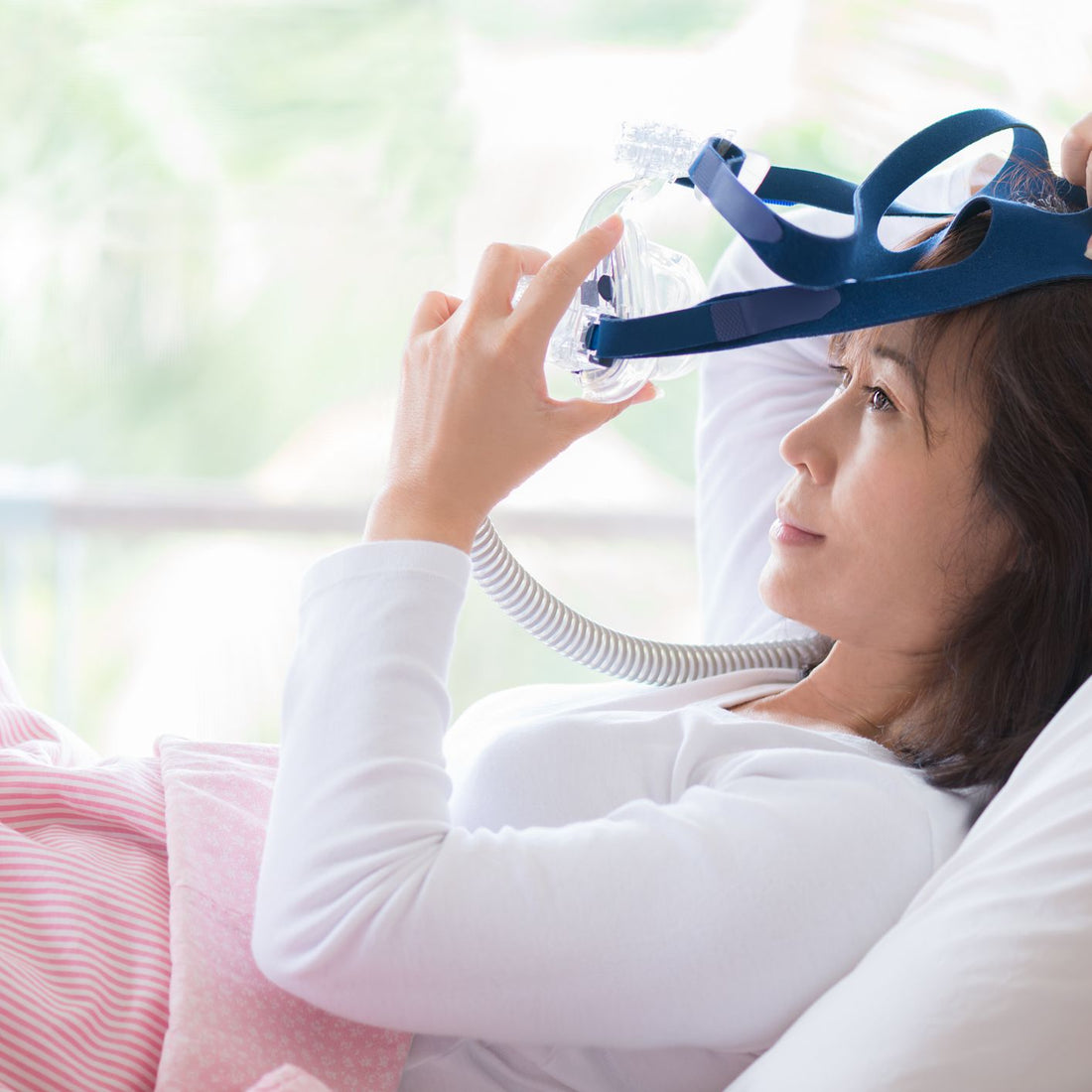News
The Link Between Sleep and Postpartum Depression
wp:paragraph So, you just had a baby! While this is an exciting time in your life, your body just underwent some massive changes, and your life has been turned upside down as you have a small child to care for. Dealing with changes in hormone levels and accumulated fatigue from pregnancy in addition to caring for a newborn means it is easy to neglect sleep. /wp:paragraph wp:paragraph Many new mothers experience postpartum depression (PPD), which should never be ignored. Numerous studies completed over the years have determined that sleep deprivation amongst new mothers is one of the biggest risk factors for postpartum depression. /wp:paragraph wp:paragraph Is it sleep deprivation or a bigger problem? /wp:paragraph wp:paragraph PPD is generally more common if this is your first child, if your baby was born premature or if you have a history of depression. A few symptoms of sleep deprivation, in general, include irritability, feeling overwhelmed, difficulty concentrating, feeling tired, and having trouble falling asleep. Typically, it becomes a little easier to sleep at night as you settle into a routine and your baby gets older and sleeps through the night more often, but this is not always the case. /wp:paragraph wp:paragraph It is important for you, and those around you, to keep an eye out for postpartum depression symptoms. These can include mood swings, sadness, frequent bouts of crying, anxiety, loss of appetite, difficulty functioning, feelings of guilt, and thoughts of harming yourself or your baby. If you get a good night’s sleep and you still feel tired, or just off in general, then you may have a more serious problem and should talk to your doctor to get help. /wp:paragraph wp:paragraph How can new moms sleep better? /wp:paragraph wp:paragraph While it is expected that your normal sleep routine may be off for a while, make sure you are eating well throughout the daytime, and you try to get in some physical activity (as much as your doctor allows you to do following delivery). Take naps in the day where time permits, and you have someone to watch your baby. /wp:paragraph wp:paragraph Don’t be afraid to turn to your support system for help, whether it be your partner, friends, family members, or a support group for moms. This can be beneficial if you need help with yourself, your baby or if you just need someone to talk to if you are feeling overwhelmed and anxious. /wp:paragraph wp:paragraph Most importantly, speak to your doctor if something doesn’t feel right. Don’t forget that taking care of yourself is just as important as taking care of your baby. /wp:paragraph wp:paragraph Contact us for more information. /wp:paragraph
about The Link Between Sleep and Postpartum DepressionDifferent Types of CPAP Machines
wp:paragraph Your CPAP machine is one of the most valuable parts of your CPAP experience. After all, without the machine, the rest of the parts will not work! /wp:paragraph wp:paragraph The CPAP machine is designed to generate continuous air pressure to relieve symptoms of sleep apnea. They are meant to last several years. If you are just starting then you may be feeling overwhelmed by all of the choices you have for CPAP machines, and that’s okay! /wp:paragraph wp:paragraph A few machines to keep in mind: /wp:paragraph wp:paragraph Standard CPAP Machine: this machine provides continuous air pressure at one specified rate, which can typically only be set by your doctor. These machines are best for patients with mild to moderate forms of sleep apnea. You will probably need the air pressure level changed over time by your doctor if you feel that the current setting is not working for you. /wp:paragraph wp:paragraph Auto CPAP machine: also known as an APAP, these machines automatically adjust the rates of the continuous air pressure throughout the night based on the changes in your breathing patterns. If you have a more severe form of sleep apnea, if you move around frequently as you sleep, or if you are going through a lifestyle change such as weight loss, then these machines are probably better for you. /wp:paragraph wp:paragraph Travel or Mini CPAP machine: this is a smaller machine that is excellent if you travel a lot and need to take the machine with you. Many of these machines have options for auto or fixed settings if you are on the go. As handy as the smaller size is, keep in mind that these machines are not meant for everyday use and may wear out quicker. /wp:paragraph wp:paragraph Be sure to check out papsmart.com if you need a CPAP machine. /wp:paragraph
about Different Types of CPAP MachinesThe Link Between Sleep and Alzheimer's
wp:paragraph January is Alzheimer’s awareness month in Canada. Alzheimer’s disease affects many older adults and can cause their thinking ability and memory to deteriorate over time. These patients face numerous struggles with their day-to-day lives, including sleep. /wp:paragraph wp:paragraph If you are caring for a loved one with Alzheimer’s, there are a few important things to know about how their sleep can be affected, and how to help them. /wp:paragraph wp:paragraph Common sleep problems amongst Alzheimer’s patients /wp:paragraph wp:list Trouble falling and staying asleep: the sleep cycle of an Alzheimer’s patient does not typically follow the same pattern of a healthy adult. They tend to wake up more often in the night and have trouble falling back asleep and their brain works differently. Daytime napping: many Alzheimer's patients tend to feel drowsy during the day and restless and agitated in the evening hours, also known as "Sundowning.” This is extremely common amongst Alzheimer’s patients Other medical issues: depression, restless legs syndrome and sleep apnea are all extremely common for Alzheimer’s patients and can negatively affect their sleep. /wp:list wp:paragraph How to resolve these sleep issues /wp:paragraph wp:list Establish a routine: it is important to keep consistency among daily activities such as mealtimes, medication, exercise and bedtime in order to promote a more restful sleep at night. Avoid stimulants: alcohol, caffeine and nicotine should be avoided before bedtime. Over the counter sleep medications such as Melatonin can be helpful but check with a doctor first as this could negatively interfere with other medications. Keep the bedroom comfortable: make sure the temperature in the room is comfortable and only use the bed for sleeping. Try and discourage afternoon napping if possible, so that it doesn’t interfere with sleep Promote relaxation in the evenings: limit the use of TV when it is close to bedtime. Instead, try listening to an audio book or playing peaceful music. Be sure to speak to a doctor for treatment if there are medical issues interfering with a proper night’s sleep. /wp:list
about The Link Between Sleep and Alzheimer'sInsomnia and Pandemic Stress
wp:paragraph Do you find yourself experiencing insomnia more than ever these days? /wp:paragraph wp:paragraph With the recent rise in Covid-19 cases thanks to the new Omicron variant, this is extremely common. A lot has recently changed with respect to gatherings, travel, work from home orders, and more, and many people are experiencing stress and not sleeping well as a result. Whether you are back to working remotely, limiting gathering with others, or if you are one of the unlucky ones that have had to deal with isolation or a positive test result, it is very common for sleep to be affected by all the uncertainty in the world right now. /wp:paragraph wp:paragraph If you are experiencing insomnia because of all of this, you are not alone. Here are a few tips to help insomnia related to pandemic stress. /wp:paragraph wp:paragraph Limit technology and media consumption /wp:paragraph wp:paragraph As tempting as it can be, try to avoid the overuse of your electronic devices including phones and tablets. Furthermore, be careful as to how much of the news you watch or read, especially news that is related to the pandemic as this can cause a lot of unnecessary anxiety, which in turn can affect your sleep. If you absolutely must keep up with the news, try reading only a few articles with relevant information or limit your news watching to 30 minutes so you don’t feel anxious and overwhelmed. /wp:paragraph wp:paragraph Get moving /wp:paragraph wp:paragraph Exercise can be extremely beneficial for helping to combat stress related to the pandemic. While some options may be limited thanks to the cold outdoor temperatures, some of the simpler exercises such as going on a walk or doing a short yoga routine at home can help with this. Exercise helps to release endorphins which are beneficial to your body when it is time to go to sleep. /wp:paragraph wp:paragraph Stick to a routine /wp:paragraph wp:paragraph For many people, stress tends to escalate when any sort of routine you have is thrown off. Routines tend to help us maintain a healthy and balanced lifestyle and to feel a sense of normalcy. This is especially true when it comes to routines that coincide with sleep. Make sure you stick to a good bedtime routine at night, which includes going to bed and waking up at the same time each day (or as close to the same time as possible). /wp:paragraph
about Insomnia and Pandemic StressTips for Better Sleep in the New Year
wp:paragraph Do you have a New Years' resolution yet? If not, 2022 may be the year to improve your sleep. /wp:paragraph wp:paragraph Resolutions to do with overall health and wellness are very common. Many people find that their sleeping habits are slacking quite a bit once the new year rolls around. The change of routine from the holidays can have a lot to do with this, but maybe you have a few bad sleeping habits happening for a while that you would like to improve on. /wp:paragraph wp:paragraph Here are a few common sleep resolutions you may want to consider implementing. /wp:paragraph wp:paragraph Going to bed at a reasonable time: have you been going to bed later and later each night? Maybe you are notorious for binge-watching TV before bed and it’s easy to lose track of the time. Or maybe you have been staying up late over the holidays whether you are celebrating or just enjoying the time off work. Make sure you get back on track and stick to a consistent bedtime. /wp:paragraph wp:paragraph Getting in 8-10 hours of sleep: most adults need at least 7-10 hours of sleep each night in order to feel well-rested and have a productive day. Similar to the last point, staying consistent in your bedtimes (and wakeup times) will help you to get enough sleep, in addition to practicing some healthy habits to promote better sleep. /wp:paragraph wp:paragraph Creating a good sleeping environment: make sure that your bedroom is an environment that is suitable for sleeping! Otherwise, it will be difficult to improve your sleep. Keep your bedroom dark and cool (but not too cold!). Use blackout curtains to keep the room dark and make sure your bed is comfortable for sleeping. /wp:paragraph wp:paragraph Practice healthy habits for sleep: staying healthy with a proper diet and exercise is important in helping you to get a good night’s sleep. Don’t indulge in coffee, alcohol, or heavy meals too close to bedtime. And keep your phone and other technological devices out of the bedroom! /wp:paragraph
about Tips for Better Sleep in the New YearSleep and the winter solstice
wp:paragraph December 21st marks the shortest day of the year, otherwise known as the winter solstice. What does this mean for your sleep? /wp:paragraph wp:paragraph The winter solstice occurs when the amount of daylight is the shortest it will be all year based on how the sun moves around the earth. If the lack of daylight is already starting to feel like a nuisance, be prepared for that day to feel a little “darker” than normal. /wp:paragraph wp:paragraph How the winter solstice can affect your sleep /wp:paragraph wp:paragraph Although it may be easy to think that darkness outside means better sleep, this is not necessarily the case. Your internal clock, also known as your circadian rhythm, relies on a 24-hour clock, which can be thrown off from the daylight outside (or lack of), making it more difficult to sleep. Insomnia is very common from this, and you may also find that it takes you longer to fall asleep as well. /wp:paragraph wp:paragraph Also, it is perfectly normal for you to feel a little more tired and fatigued than normal during the daytime hours thanks to the lack of daylight. You may also find yourself feeling a little moody and unmotivated from the lack of daylight, which in turn can affect your sleep. /wp:paragraph wp:paragraph A few tips to beat the winter blues /wp:paragraph wp:paragraph Try and get outside during the daytime when it is light out, as your circadian rhythm can be improved from exposure to sunlight. While this may not be possible every day, there are daylight lamps that may help with this. /wp:paragraph wp:paragraph Avoiding technology before bed is also important for sleeping better. The blue light from your cell phone can disrupt your circadian rhythm and make it difficult to fall and stay asleep. Experts recommend doing stretches before bedtime to help you feel relaxed. /wp:paragraph wp:paragraph A few other things that will help include reading a book before bedtime, using a sleep mask, keeping the temperature of your room on the cool side and using blackout curtains to help you sleep better. /wp:paragraph
about Sleep and the winter solsticeSleep Tips for the Holidays
wp:paragraph The holiday season can be such a wonderful time of year, but it can also be very disruptive to your sleep schedule in a number of ways. Don’t let the lack of sleep turn you into a grinch! Here are a few ways in which your sleep can be disrupted over the holidays, and how to fix it. /wp:paragraph wp:paragraph Being too busy: yes, the holidays are a busy time between parties, gatherings, shopping, and more. This can make you feel overwhelmed and in turn, can affect your sleep if you are feeling anxious about everything you have to do. Take some time to slow down. Prep in advance as much as you can so you don’t feel as overwhelmed and try not to take on more than you can handle. /wp:paragraph wp:paragraph Eating habits: it’s natural to want to indulge in some of your favorite foods at this time of year, it’s just too irresistible! But be careful, going to bed when you feel too bloated can disrupt your sleep and cause insomnia, not to mention it can be very uncomfortable. Pace yourself at the dinner table and stop eating when you feel full. /wp:paragraph wp:paragraph Drinking too much: whether you are gathering with loved ones or just enjoying a quiet night at home where you don’t have to work the next day, many people tend to go overboard drinking during the holidays. Drinking too much alcohol before bedtime can disrupt your REM sleep, making for a very restless night. An extra drink or two is usually okay but don’t go too crazy, and be sure to stay hydrated. /wp:paragraph wp:paragraph Not enough exercise: while it may seem too easy to just sit on the couch watching your favorite Christmas movies, be sure to get up and get in some physical activity. Try to go for a walk at least once a day or take this time to partake in your favorite outdoor winter activity. It can also be a great family bonding opportunity. /wp:paragraph wp:paragraph Sleeping in and staying up late: yes, late nights happen, and if you stay up late then you may find yourself sleeping in as a result, especially if you know you don’t have to work the next day. Slip-ups happen and that’s okay! Just make sure you don’t deviate too much from your routine and you get back on track the next day. /wp:paragraph
about Sleep Tips for the HolidaysSleep Tips for Holiday Travel
wp:paragraph Thinking of going away over the holiday? Many people experience poor sleep whenever they travel, whether they are going to an unknown destination or staying with family. All of the excitement and disrupted routines surrounding the holidays do not help either. /wp:paragraph wp:paragraph Whether you are going on a road trip or braving the airports to venture somewhere a little further away, here are a few tips to keep in mind to help make sure you can still get a good night’s sleep wherever you are. /wp:paragraph wp:paragraph Plan ahead: stress is one big reason why sleeping away from home is not always great. Take the time beforehand to figure out other factors like packing, your itinerary, and other logistics to reduce stress while you are away. /wp:paragraph wp:paragraph Maintain a routine: while your normal sleep routine may be disrupted, try your best to stick to your usual sleeping routine. Try to go to bed as close to your normal bedtime as you can and limit the use of technology for 1 hour before you go to bed. If you are traveling to a different time zone, be sure to adjust your sleep to the current time zone in order to make the most of your trip. /wp:paragraph wp:paragraph Bring the essentials: Be sure to pack a few sleeping essentials such as earplugs, sleeping masks, melatonin, warm pajamas, and your favorite book just to make yourself feel at home and more comfortable at bedtime. /wp:paragraph wp:paragraph Practice healthy habits: sticking to healthy diet and exercise habits will help with your sleep. Eat a balanced diet, get some exercise throughout the daytime, and don’t overdo it with alcohol. /wp:paragraph wp:paragraph Relax and enjoy the holidays: it’s a happy and joyous time of year so make sure you give yourself time to enjoy it! Bad sleep happens to everyone at some point. If you have one rough night’s sleep, give yourself a little grace. It’s just one night and you can get back on track the next day. /wp:paragraph wp:paragraph After reading sleep tips for holiday travel you can read "Travelling with a CPAP Machine". /wp:paragraph
about Sleep Tips for Holiday TravelGet Your CPAP Ready For The Winter
wp:paragraph The nights are starting to get colder, but this doesn’t mean that your sleep needs to suffer as a result. Sleep apnea symptoms have been known to be much worse in the wintertime, thanks to the cold and dry air that can dry out your mouth and nasal passages, making it more difficult to sleep. If you use a CPAP machine, then now is the time to make sure it is ready for winter use! Here are four things to think about when it comes to getting your CPAP ready for the winter. /wp:paragraph wp:paragraph Don’t skip humidification: This doesn’t just apply to the humidifier you may use in your bedroom to prevent dry air (though this is beneficial in sleeping better) using a humidifier and/or heater with your CPAP machine will help to prevent your airway from drying out and make for a more comfortable user experience overall. /wp:paragraph wp:paragraph Make sure the parts are in working order: Take a moment to do a quick inventory of all the parts on your CPAP machine, including the tubing, the mask, humidifier and any filters that may be required. If a part is wearing down or not in good working condition, then this can cause the rest of the CPAP to not work properly. Don’t wait until it’s too late to replace these parts, make sure you get them ahead of time. /wp:paragraph wp:paragraph Keep the machine clean: Regular cleaning of your CPAP is important at any time of year, but this is especially the case in the wintertime, when your humidifier and/or heater is being used on more of a regular basis and moisture from this builds up. /wp:paragraph wp:paragraph Don’t skip the CPAP when you are sick: Colds are no fun, and it may be tempting to skip the CPAP for just a night or two if you are feeling stuffed up but don’t do this! Rest is extremely important for recovery, and skipping the CPAP even for just a night can cause your sleep apnea symptoms to worsen and make for a poor night’s sleep. /wp:paragraph
about Get Your CPAP Ready For The Winter








